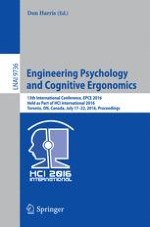2016 | OriginalPaper | Buchkapitel
Influence of User Characteristics on Coping with Stress
verfasst von : Matthias Haase, Martin Krippl, Swantje Ferchow, Mirko Otto, Jörg Frommer
Erschienen in: Engineering Psychology and Cognitive Ergonomics
Aktivieren Sie unsere intelligente Suche, um passende Fachinhalte oder Patente zu finden.
Wählen Sie Textabschnitte aus um mit Künstlicher Intelligenz passenden Patente zu finden. powered by
Markieren Sie Textabschnitte, um KI-gestützt weitere passende Inhalte zu finden. powered by
